- 21.08.2025 - 13:11
Digital PROM monitoring eases post-operative follow-up after hip and knee surgery
Key message: A digital, PROM-based monitoring program with automated alerts reduces healthcare spending and outpatient utilization in the first year after hip/knee replacement—offering a promising lever to conserve scarce resources.
Background
Health systems face dual pressures: rising demand and a shrinking workforce. Digital monitoring via Patient-Reported Outcome Measures (PROMs) that triggers interventions when abnormalities occur may be a promising approach.
Study & design
Our new publication, PROM-based monitoring and alerts reduce post-surgery healthcare utilization of patients undergoing joint replacement: A secondary analysis of the PROMoting Quality RCT, presents a secondary analysis of the randomized controlled PROMoting Quality trial conducted in nine German hospitals (recruitment 10/2019–12/2020). We analyzed cost data from 546 hip and 492 knee patients (total n=1,038). In addition to standard follow-up, the intervention group received digital PROM monitoring at 1, 3, and 6 months post-op with automatic alerts for clinically relevant deterioration; study nurses contacted patients and, when necessary, provided recommendations.
Results (12-month follow-up)
Our hypothesis: The effects likely arise from a “feeling looked-after” effect that reduces reassurance-seeking visits.
Implications for practice & policy
Publication
PROM-based monitoring and alerts reduce post-surgery healthcare utilization of patients undergoing joint replacement: A secondary analysis of the PROMoting Quality RCT, The European Journal of Health Economics.
Full text: link.springer.com
